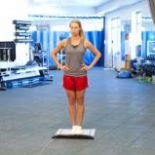
Introducing MobileMat BESS: Objective Baseline & Return-to-play Testing
Balance, Concussion & Testing
Over the past several years, there has been an increased focus on better understanding and assessing concussions in sports. Professional, college and high school teams and sports medicine clinicians are doing more and more to ensure that athletes do not return to play too quickly after suffering a concussion. The BESS test (or modified BESS test) is a balance assessment protocol that was developed specifically for assessing sports concussions. It is part of the SCAT3™ Sport Concussion Assessment Tool, which was created by a group of international experts as a standard protocol for concussion testing. Although the BESS test is generally accepted by the clinical research community, some concerns have been raised about inter- and intra-rater reliability of the manual scoring. MobileMat™ BESS addresses these concerns by automating the process and virtually eliminating the opportunity for human error.
"We knew that postural stability and balance are related to a lot of public health issues in the US today – everything from concussions in young athletes to falls in the elderly - so we started looking at all of the balance tests and protocols out there to see where Tekscan could add value through automation. When we learned about the BESS test, we said, here is a well-accepted, validated test, but it’s susceptible to human error. We can help with that," said Peter Gantchev, Senior Medical Product Manager at Tekscan. Gantchev worked closely with Neil Letendre, Sr. Software Manager at Tekscan, to conceptualize and develop the product. As Letendre says, "We knew we could do accurate balance testing with our mat systems, so it was really a matter of developing some new software that would walk testers through the BESS protocol and provide a reliable score."
In order to ensure the product scored the BESS test accurately, Tekscan sent it for validation testing with researchers at the University of Delaware. The researchers there, led by Dr. Thomas Kaminski, tested the scoring of the MobileMat BESS system against their usual testing protocol. After testing nearly 100 athletes at their facility, they found that the MobileMat BESS scored balance errors just as well as their three trained testers.
"MobileMat BESS provides a new level of assurance to team physicians and athletic trainers; that the BESS scores for their athletes will always be determined in the same way, regardless of the training and experience levels of the tester," said Jaclyn Caccese, Doctoral Student - Biomechanics and Movement Science, University of Delaware. "This gives them the peace of mind and confidence that they can meaningfully compare and trend their athletes' BESS scores relative to their baseline, even over multiple seasons."
Update: MobileMat BESS has been updated to include more features since this press release was issued. For more information about the new software, visit the SportsAT™ page.